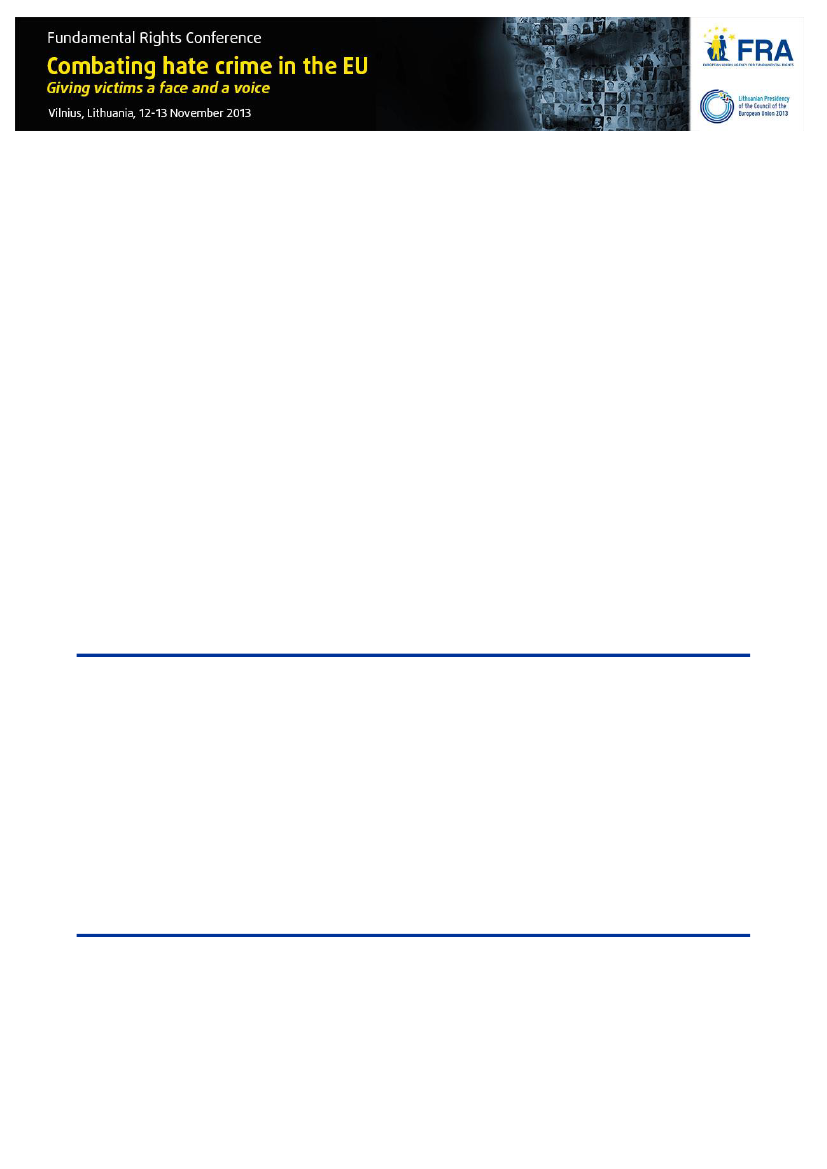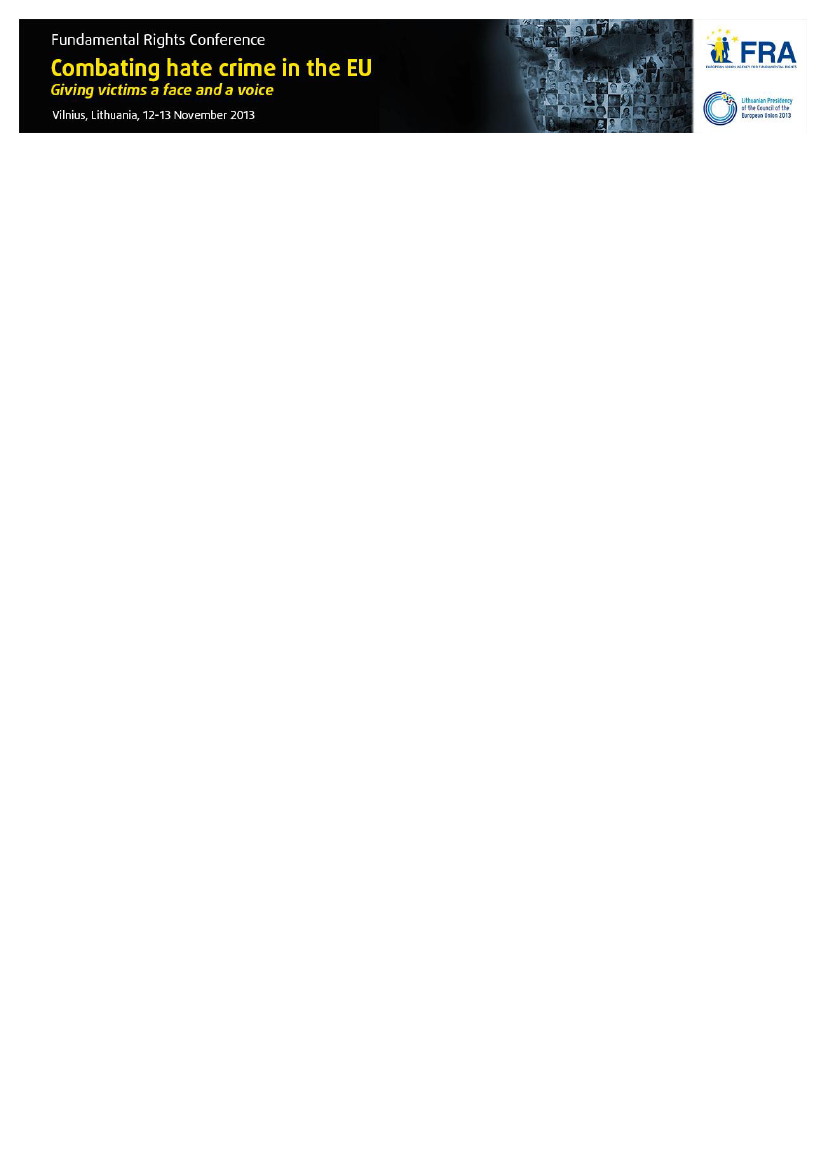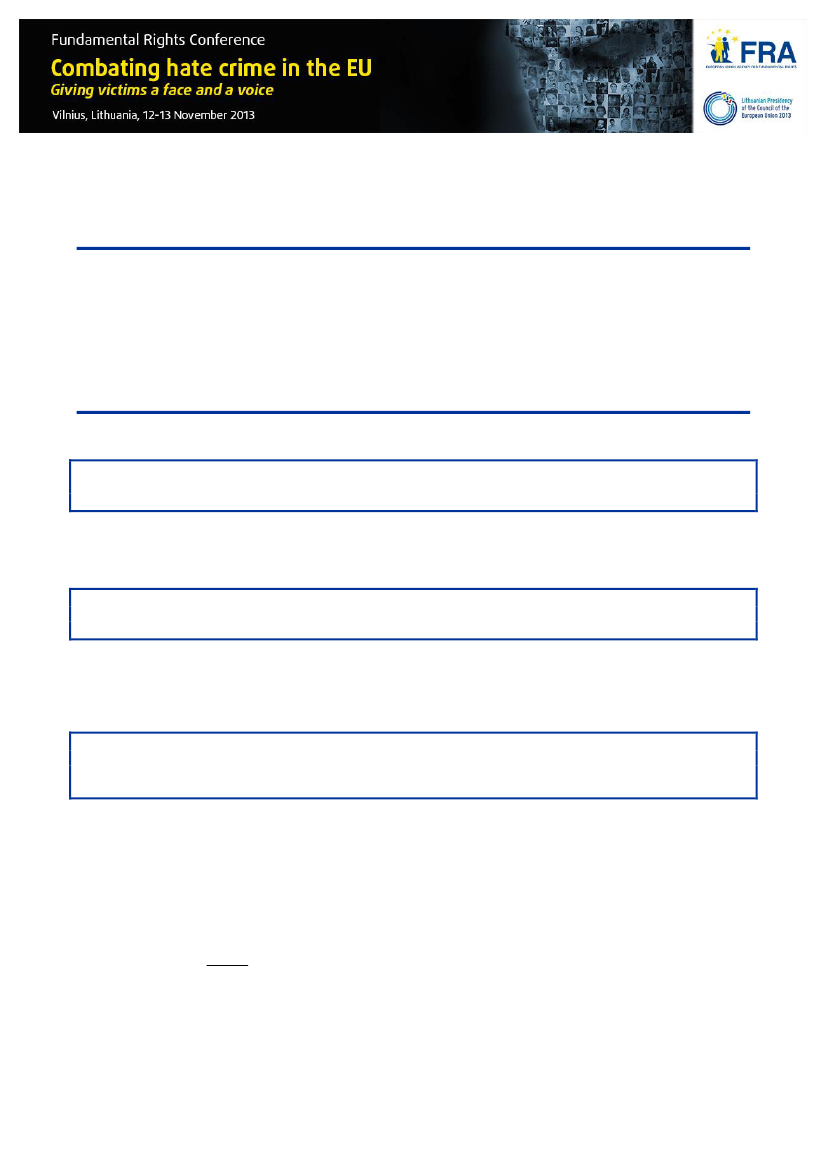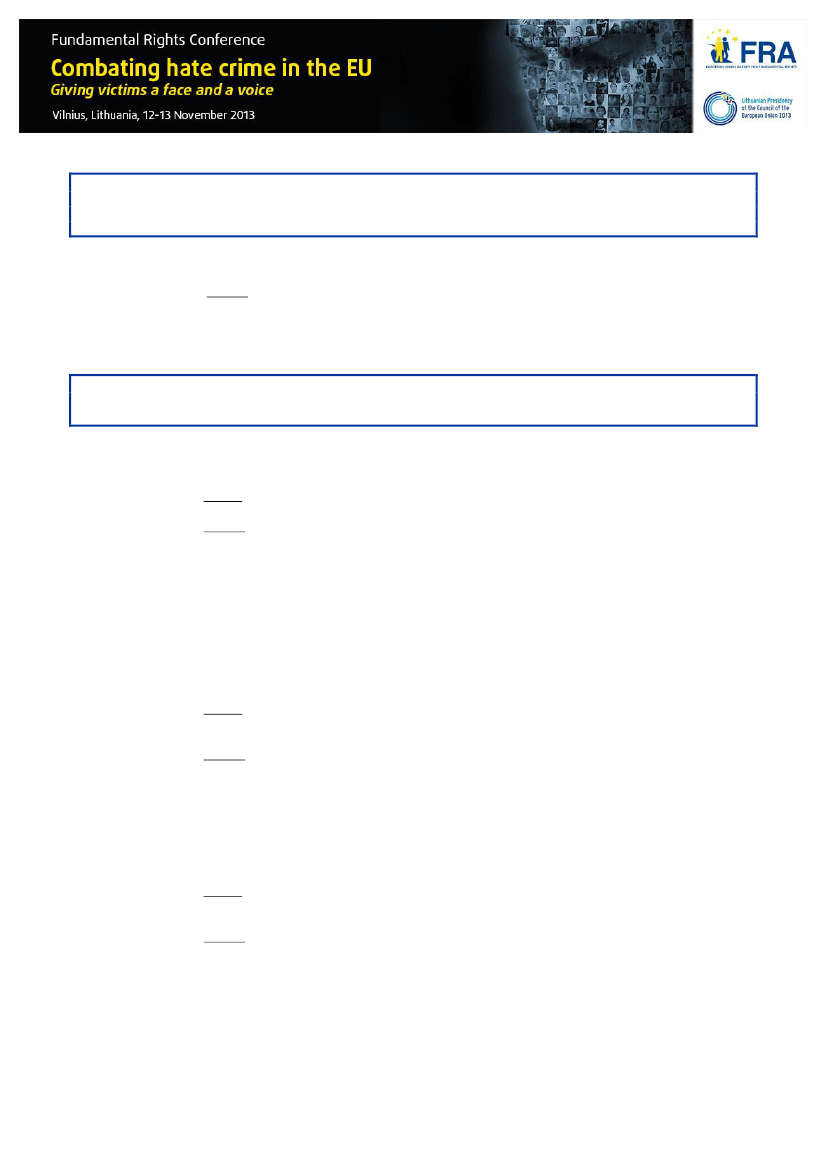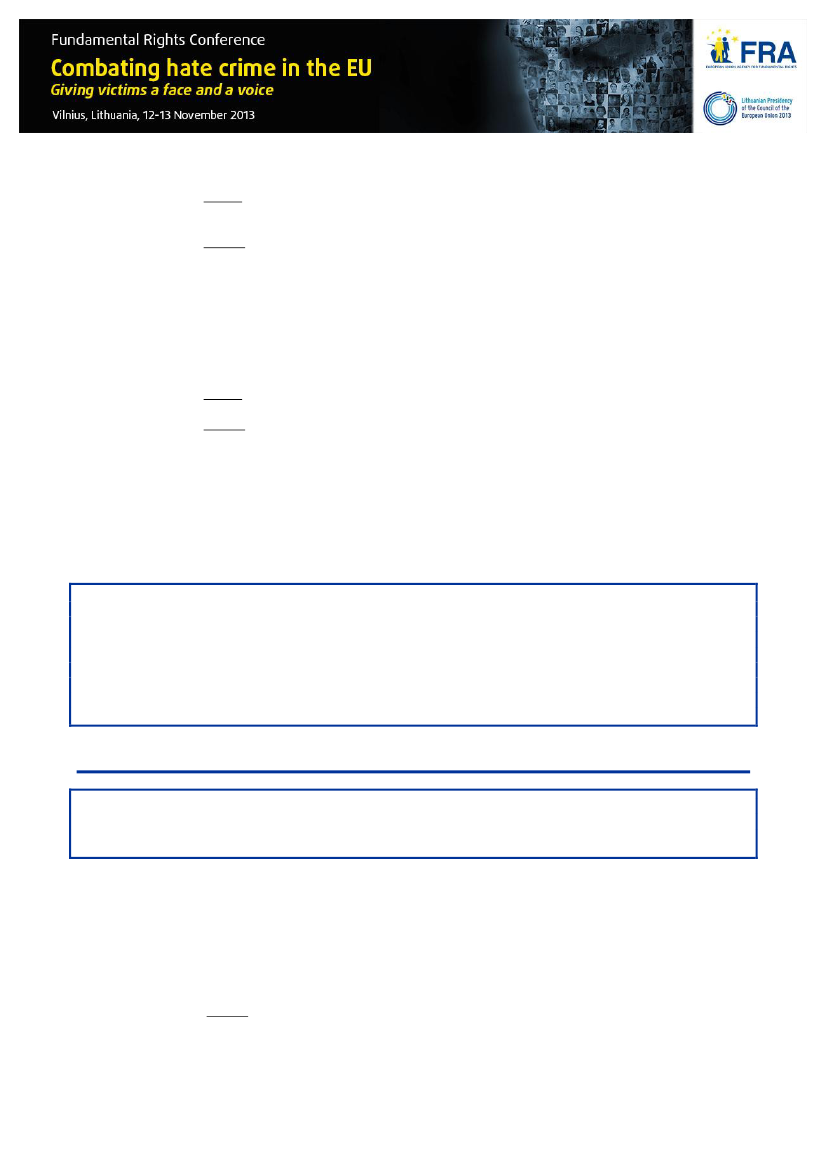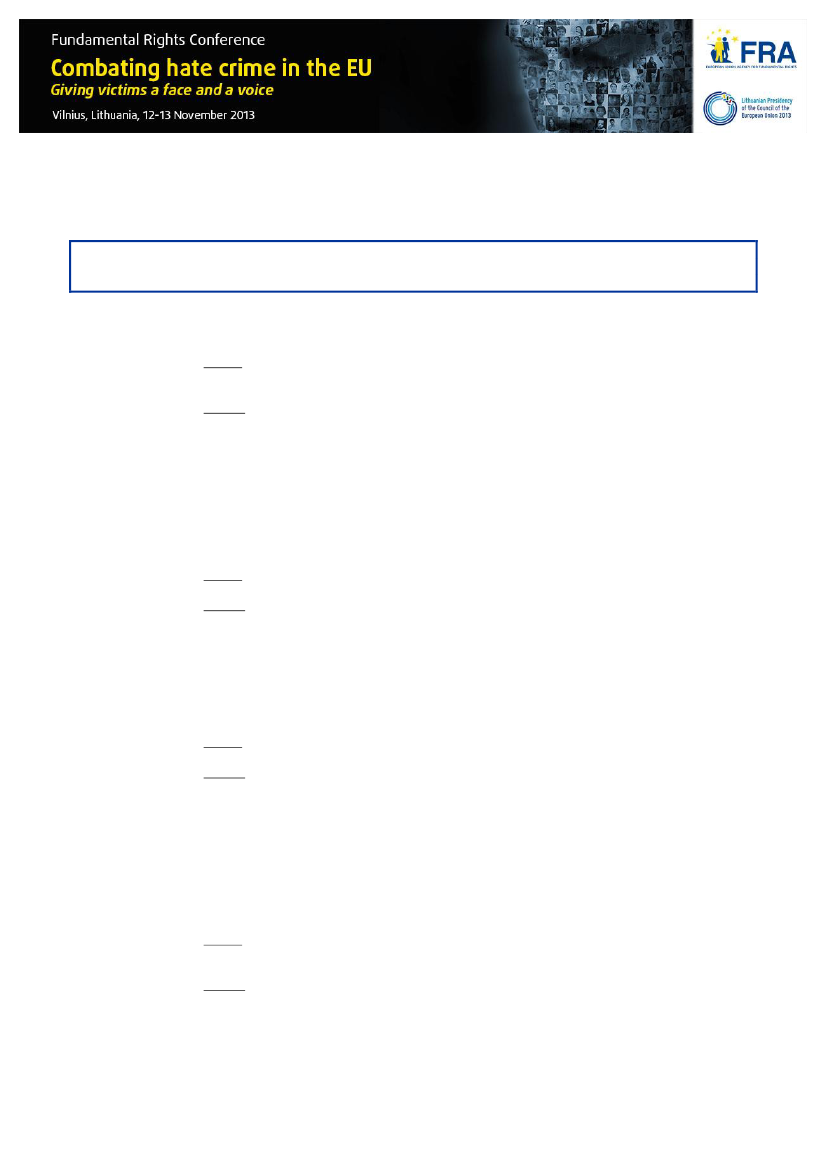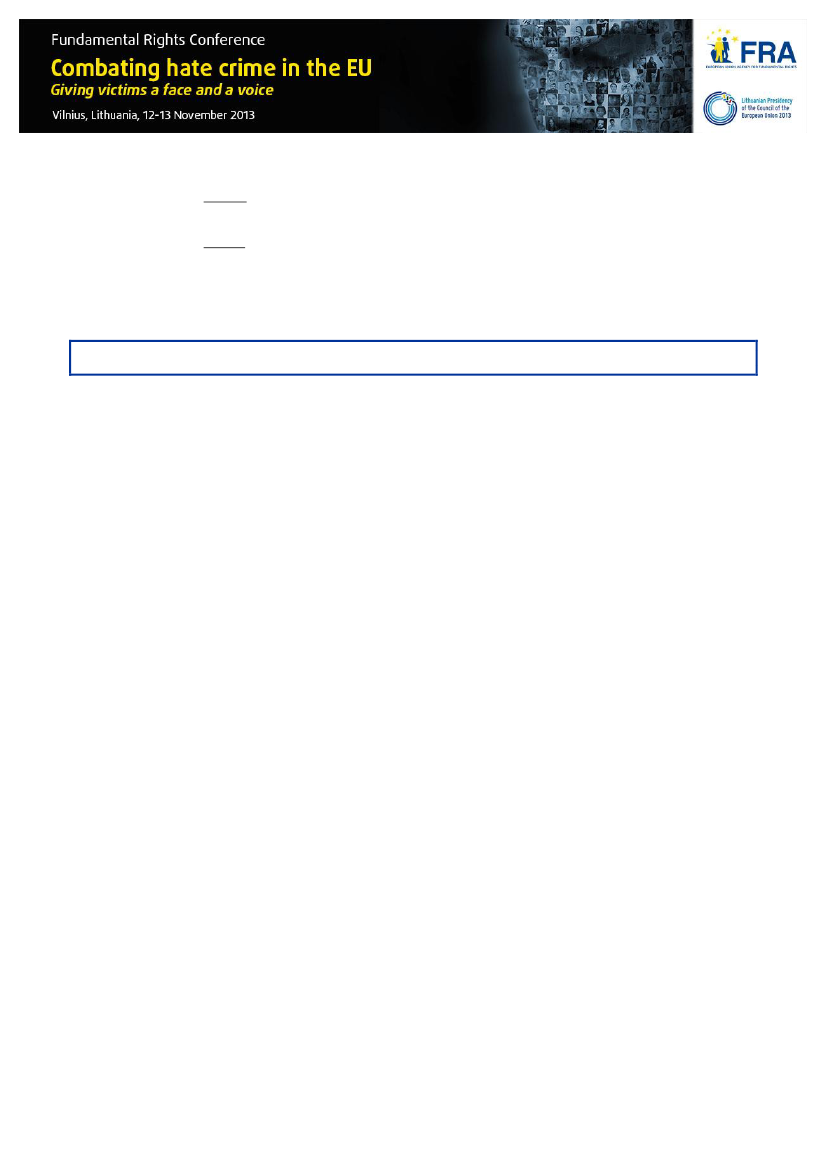Udvalget for Udlændinge- og Integrationspolitik 2013-14
UUI Alm.del Bilag 6
Offentligt
FUNDAMENTAL RIGHTS CONFERENCE 2013Combating hate crime in the EU
Giving victims a face and a voice12-13 November 2013, Vilnius, LithuaniaLitexpo conference centre (Laisvės ave. 5)
The Fundamental Rights Conference (FRC) is a high level annual event, organised by theEuropean Union Agency for Fundamental Rights. In 2013 the conference will focus on‘Combating hate crime in the EU’and will be hosted in cooperation with the LithuanianPresidency of the Council of the EU.The event will bring together over 300 policy makers and practitioners from the EU as well asnational levels, among them representatives from EU institutions and bodies, internationalorganisations, national governments and parliaments, law enforcement, civil society and manymore.Conference discussions will build on FRA’s reports onMaking hate-crime visible in theEuropean Union: acknowledging victims’ rights,and ‘Minorities as victims of crime (EU-MIDISData in Focus 6)’, as well as on findings of FRA’s EU-LGBT and antisemitism surveys, amongothers.
OBJECTIVESTo develop concrete proposals forfollow-up on FRA’s opinions pertainingto hate crime, as formulated in itsreports on the subject;To explore practical solutions for victimsupport services tailored to specificsituation and needs of the victims ofhate crime;To stimulate debate on hate crime andexchange ideas and practices on how tocombat it on an EU as well as MemberState levels;To pool evidence and expertise of avariety of stakeholders in view of theforeseen review of Council FrameworkDecision 2008/913/JHA of 28 November2008 on combating certain forms andexpressions of racism and xenophobiaby means of criminal law;Toenhancecooperationbetweenstakeholders at different levels tocounter hate crime more effectively.
BACKGROUNDViolence and crimes motivated by racism, xenophobia, religious intolerance or by a person’sdisability, sexual orientation, gender identity and other biases – often referred to as ‘hatecrime’ – are a daily reality throughout the EU, as data collected by FRA and other actorsconsistently show.Hate crime harms not only those targeted. It also sends a signal to other persons who feel thatthey are at risk of being labelled and treated like the victim. Moreover, the bias motivatedoffence, when understood as a statement about persons who (are thought to) bear a certaincharacteristic, has the potential to incite followers. The impact of hate crime thus reaches farbeyond the immediate interaction between offender and victim.1
As such hate crimes call into question the basic concept and self-understanding of modernpluralist societies, which is based on the notion of individual human dignity. Hence, it strikes atthe heart of EU commitments to democracy and the fundamental rights of equality and non-discrimination.However, victims of crimes motivated by bias and prejudice are often unable or unwilling toseek redress against perpetrators. Many of these crimes remain unreported, unprosecutedand, therefore, invisible. In such cases, the rights of victims of crime may not be fullyrespected or protected and Member States may not be upholding obligations they havetowards victims of crime.The Fundamental Rights Conference will therefore invite decision makers and practitioners toexplore effective strategies to combat crimes motivated by hatred and prejudice at thenational as well as EU level. Discussions will address the most pertinent issues relevant forpolicy making in the field, among them:Existing evidence on the extent of hate crime;Underreporting of crimes motivated by hatred and prejudice;Gaps in hate crime monitoring and recording;Legal instruments pertaining to hate crime in the EU;Victim support services;Effective practices of investigation and prosecution;Discriminatory aspects of hate crime;Human rights education and remembrance;Capacity building for law enforcement and criminal justice systems;Challenges of cyberhate;and other issues.
Existing legal and policy measuresConference discussions will take place in the context of current legal and policy framework tocombat crimes motivated by hatred and prejudice in the EU. Discussions will place particularfocus on the implementation of the Council Framework Decision 2008/913/JHA on combatingcertain forms and expressions of racism and xenophobia by means of criminal law aiming toinform the revision of this decision foreseen for the end of 2013; as well as recently adoptedEU Victims’ Directive (2012/29/EU), establishing minimum standards on the rights, supportand protection of victims of crime.
2
DRAFT PROGRAMMEMONDAY, 11 NOVEMBER14.00 – 19.3019.30ARRIVAL AND REGISTRATIONWELCOME RECEPTIONHosted by the European Union Agency for Fundamental Rights (FRA)(Hotel Crowne Plaza Vilnius, M.k. Čiurlionio str. 84)
TUESDAY, 12 NOVEMBER08.30 – 9.30Registration
09.30 – 10.00
WELCOME
Juozas Bernatonis,Minister of Justice, LithuaniaMorten Kjaerum,Director, FRA
10.00 – 10.30
KEYNOTE ADDRESS
Cecilia Malmström,European Commissioner for Home Affairs10.30 – 11.00COFFEE BREAK
11.00 – 12.30
PANEL DEBATE:Crimes motivated by hatred and prejudice – where are we today?
High level panel debate with policy makers and experts:László Surján,Vice-President, European ParliamentAlan Shatter TD,Minister for Justice and Equality, IrelandChristiane Taubira,Minister of Justice, France (tbc)Cecile Kyenge,Minister of Integration, Italy (tbc)Ambassador Janez Lenarčič,Director of the OSCE Office for DemocraticInstitutions and Human RightsFocus:What is the nature of hate crime? What is the situation on the ground?What are the most pressing legal as well as practical challenges to combathate crime effectively?12.30 – 14.00LUNCH
3
14.00 – 15.15
REFLECTIONS IN THE PLENARYDifferent faces of hate crimePanel debate with organisations representing victims of hate crimeFocus:How does hate crime look in reality? What are the experiences of thoseaffected?What impact does it have on targeted communities and the society as awhole?
15.30 – 17.30
WORKING GROUPS
Working group I: Making hate crime visible: strategies to build trust andencourage reportingChair:Christos Giakoumopoulos,Director for Human Rights, Council of EuropeFocus:How can the trust of victims and witnesses in law enforcement authoritiesand criminal justice system be increased?Which reporting mechanisms have proven to be most effective and why?What lessons can be learned from experiences in EU Member States?How does cooperation between law enforcement agencies, the criminaljustice system and non-governmental organisations work in practice?How can monitoring of hate crime by civil society organisations and otheractors be put to better use to make hate crime visible?Working group II: Challenges of cyberhateChair:Troels Oerting,Head of European Cybercrime Centre (EC3) and AssistantDirector, Operations Department, EUROPOL – European Police OfficeFocus:What legal instruments, policies and measures are in place at Member Stateand EU level to address cyberhate?What is the role of different actors tackling cyberhate?What practical measures could be implemented by governments, internetproviders, civil society organisations and citizens?Working group III: Legal instruments pertaining to hate crime in the EUChair:Salla Saastamoinen,Head of Unit Fundamental rights and rights of the child,DG Justice, European CommissionFocus:What legal instruments are available to EU Member States to address hatecrime at the EU and international levels?How robust is the existing legislative framework? What steps could be takento improve the situation?What is the impact/direction of recent jurisprudence of ECHR as well as theCJEU?
4
Working group IV: Assistance for victims of hate crimeChair:Paul Iganski,Head of Department of Applied Social Science , University ofLancasterFocus:What are the needs of victims of hate crime?What assistance schemes are most effective – public services, non-governmental organisations, generic or specialist victim support services, ora mixture of systems?How does the legal system guarantee effective redress for victims of hatecrime?Working group V: Ensuring effective investigation and prosecutionChair:Alinde Verhaag,Head of Case Analysis Unit, EUROJUSTFocus:Recognising hate crime/uncovering the motive – what are the most effectivestrategies?How can we develop good hate crime indicators for law enforcement?How has cross-border judicial cooperation worked so far? What challengesremain?How is the Framework Decision on Racism and Xenophobia implemented atthe national level? How does this impact on the investigation and prosecutionof hate crime?Enhanced penalties vs. aggravating circumstances
19.30
EVENING RECEPTIONAT THE NATIONAL MUSEUM PALACE OF THE GRAND DUKES OF LITHUANIAHosted by the Lithuanian Presidency of the Council of the EUOpening byRemigijus Motuzas,Deputy Chancellor, Office of the Government of the Republic ofLithuania
WEDNESDAY, 13 NOVEMBER09.00 – 10.30PANEL DEBATE:EFFECTIVELY RESPONDING TO HATE CRIME – FROM LEGISLATION TOPRACTICEPanel debate with policy makers and legal practitioners:Emine Bozkurt,Chair of the Anti-Racism and Diversity Intergroup, Member of theEuropean ParliamentDanutė Jočienė,Judge, European Court of Human RightsMarinos Skandamis,Crime Policy Secretary General, Ministry of Justice,Transparency and Human Rights, GreecePierre Baussand,Director, Social PlatformFocus:How are legal obligations with regard to hate crime implemented in practice?What will the Victims Directive mean for victims of hate crime?The Framework Decision on Racism and Xenophobia: how well has it workedso far?Should subsequent legislation cover the same areas or be broadened?
5
What are the advantages and risks of more encompassing legislation in thisarea?
10.30 – 11.00
COFFEE BREAK
11.00 – 13.00
WORKING GROUPS
Working group I: Recording and monitoring hate crime: strategies toimprove official data collection mechanismsChair:Floriane Hohenberg,Head of Tolerance and Non-Discrimination Department,OSCE Office for Democratic Institutions and Human Rights (ODIHR)Focus:What mechanisms of data collection are currently in place and how can theybe improved?What are the current gaps in data collection? What can we learn fromexisting promising practices in EU Member States?Uncovering the dark figure of hate crime – what is the role of crimevictimisation surveys?Working group II: Reflecting remembrance in human rights education andtrainingChair:Pavel Tychtl,DG Communication, European CommissionFocus:How can remembering the past contribute to understanding the present?How can we best reflect remembrance of common European history in humanrights education and training programmes?What promising practices are there in this field?Working group III: Vigilance and awareness: capacity building for lawenforcement and criminal justice systemsChair:Aija Kalnaja,Head of Training Unit, CEPOL - European Police CollegeFocus:What are the effective ways to build capacity for law enforcement andcriminal justice systems?In what way should the specificity of hate crime be reflected in curricula forlaw enforcement agents and those involved in the criminal justice system?What type of training on the issue is currently available in EU Member States?What could/should be improved?Working group IV: Connecting the dots – discrimination as a trigger for hatecrimeChair:Karen Jochelson,Director of Economy and Employment Programme, Equalityand Human Rights Commission, United KingdomFocus:What are the discriminatory aspects of hate crime?How can equality and non-discrimination education help prevent/fightdiscriminatory crime?What are effective strategies to raise awareness about the detrimental effectsof discrimination?
6
Working group V: Gross trivialisation: negating crimes of the pastChair:Fran§oise Tulkens,former Vice-President of the European Court of HumanRightsFocus:What is the discriminatory aspect of revisionism/negationism, as defined inthe Art 1.1 of the Framework Decision on Racism and Xenophobia?Why is it important for revisionism/negationism to be criminalised?How can we best acknowledge the rights of victims of crimes of genocide,crimes against humanity and war crimes?13.00 – 13.30CLOSING REMARKSVytautas Leškevičius,Vice-Minister of Foreign Affairs, Lithuanian Presidency ofthe Council of the EUG.F. Ioannidis,Secretary General, Ministry of Interior, GreeceManfred Nowak,Vice-Chairperson of the Management Board, FRA13.30 – 15.00LUNCH
7
